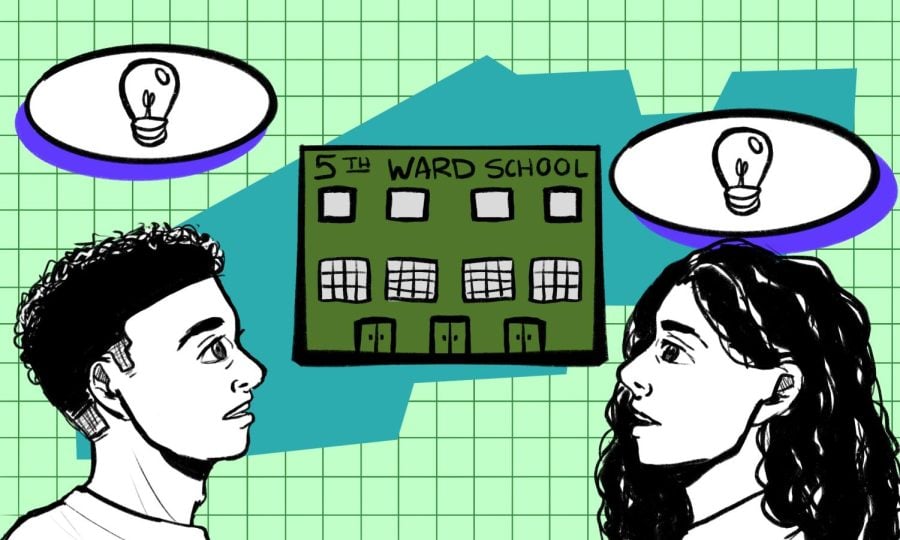STEM School Evanston seeks feedback from Black residents
In Monday’s letter, 5th and 2nd Ward families, whose children would likely attend the future 5th Ward school, said that “recent revelations regarding budgetary and cost estimates have given us cause for concern.”
July 28, 2022
Evanston’s 5th Ward has not had a community school for more than 50 years. With an elementary school on the way, nonprofit STEM School Evanston aims to ensure community voices are heard.
The group seeks input from Black residents to mold the ward’s new school through the “Amplifying Black Voices on Education Equity in Evanston” initiative. The project, which began in 2021, released a survey in April that is open through August. It takes about 10 minutes to complete.
African American Studies Prof. kihana miraya ross is the co-principal investigator for the project. She leads the ethnographic component of the research, which involves conducting interviews and focus groups with Black residents. These interviews aim to understand how Black Evanstonians have experienced education, if they experienced racialized harm and how they would change the current educational structure to better suit their needs.
“Oftentimes, people, particularly researchers, talk about a community without actually talking to that community,” ross said. “It’s always important before you embark on any kind of work that you have a genuine sense of how the community feels, what they need.”
The survey allows Black residents to rate their experiences and perceptions of the Evanston school system, focusing on how it serves or harms Black and brown students. There is also space for short answers, as well as an opportunity to help choose the name of the new school.
Dr. Bessie Mbadugha is a former chemistry professor who has worked on grant writing for STEM School Evanston since 2019. She lived in the 5th Ward while completing her postdoc at NU, never realizing the children she saw taking the buses to school every morning weren’t going to a local school. She said listening to the community is central to the nonprofit’s efforts.
“We had to think, ‘Well, how do we get a better sense of what would be the best thing for this community?’ As opposed to us coming in and sort of prescribing a solution, let’s hear from actual residents,” Mbadugha said.
“Amplify” received $54,000 in funding from NU’s Racial Equity and Community Partnership Grant Program. STEM School Evanston founder Henry Wilkins said the money will help fund the “Amplify” project so the future school will be fully prepared to address residents’ needs.
“Let’s say they want (a STEM focus) to be incorporated,” Wilkins said. “If you want to show there’s a higher focus of STEM, you have to think, ‘What type of equipment is needed? ‘What type of curriculum? What books do you use? All that planning happens far in advance and it takes time to get all that together.”
Mbadugha said the group will gain feedback from the community they most directly serve by focusing on Black voices, who are frequently overpowered by louder groups. Getting both qualitative and quantitative data will lead to an even richer perspective on how residents feel, Mbadugha said.
Both Mbadugha and Wilkins said they hope the survey will help attract respondents who want to know that their response will make an impact.
“What’s exciting is we’re doing this survey before decisions are made about the school. And the school is happening,” Wilkins said. “It’s not just a hypothetical like, ‘Well, what if there was a school, what would you want?’ It’s happening.”
In terms of next steps, Mbadugha said data compilation and analysis will take up much of the team’s time. Once that data is analyzed and relayed to the community to ensure its accuracy, ross said she hopes to share the findings with Evanston/Skokie School District 65 and other Evanston schools and work toward implementing policies and plans in accordance with the findings.
Those working on the project have reached out to the community several ways, including door-to-door canvassing and attending community events and religious gatherings. Wilkins said they tried not to rely solely on digital methods, even if COVID-19 made in-person interaction difficult.
ross said “Amplify” is the first project she knows about of its kind. Coupled with the fact that Evanston was the first city to pledge dollars toward reparations for its Black residents in the U.S., ross said she hopes Evanston can serve as a model for how other countries address racial inequity by letting the community’s voice guide the progress.
“Education is a particularly powerful tool for addressing some of the racialized disparities in society,” ross said. “That doesn’t mean that schools in and of themselves are going to heal or fix anti-Blackness in this country. But I think that given that nearly every kid is going to school, there’s a lot that can be done there.”
Email: [email protected]
Twitter: @AudreyHettleman
Related Stories:
— Community members pack historic District 65 school board meeting to establish 5th Ward school












